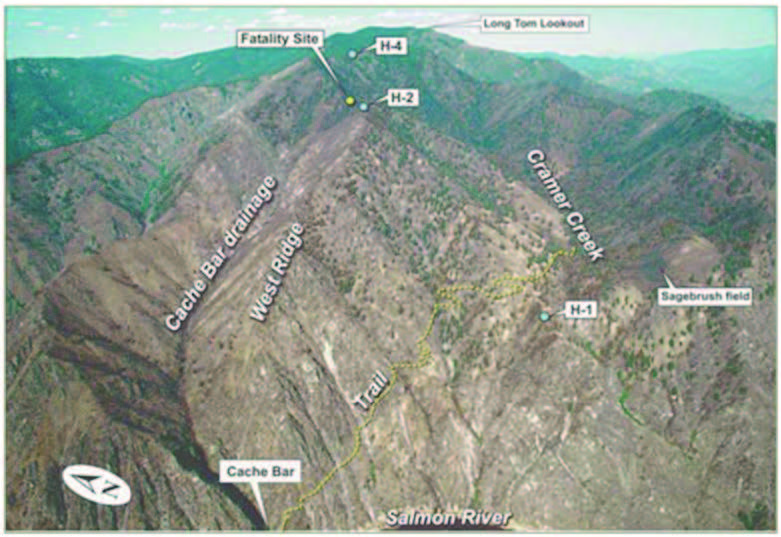The Cramer fire began as a fairly typical mid-slope ignition on the south-faciing slope of the steep Salmon River Canyon during an extended drought in late July 2003. On July 22, the fourth day after ignition, and three days from detection and engagement, the fire made a run that entrapped and killed two young men from the local Indianola helitack crew. Nearly a year after the event, the Agency initiaged legal action against some its own employees.
June 25-27th 2012, nine years after the Cramer Fire, the Salmon-Challis National Forest held their first Staff Ride to learn from the event. The Staff Ride covers two parallel tracks: the events that led to the deaths of two young men, and how the Agency dealt with it in the aftermath, thus has lessons for both tactical fire and strategic land managers.
For a variety of reasons – there were fatalities, the fallen were members of the community, allegations and legal actions were taken by the Agency against Agency employees – the incident has had significant personal, professional, legal and organizational ramifications. As might be imagined, the event scarred individuals, relationships and the local organization. It became ‘taboo’.
Because of this emotional valence, the Forest wanted to keep this initial Staff Ride local. By 2012, they felt they were ready: sufficient time had passed for most of those directly involved to psychologically process the events, and at least some of the event’s participants were willing to assist in and/or participate in the Staff Ride as presenters. Although the Indianola Guard Station subsequently closed, this high-fire Forest continues to maintain a helitack crew. In sponsoring the development of and then hosting the Staff Ride, the Forest leadership hoped to stimulate a variety of opportunities - healing, learning, and honoring the fallen.
For the 90 participants, take-aways included how communication gaps and small, normal organizational lapses can build; how an organization reacts to tragedy is important and how it can better help those affected; how the event stimulated changes in accident investigation policy, procedures and coordination; and questions about how do we learn from this as an organization?
With the Past Event page, we seek to provide a format for continued learning, and challenge readers to consider how might you and your organization - as a unit and as individuals - keep a learning conversation going?
Related Documents from the Research and Publications Database
Recording(s)
Event Details
Jun 25 - 27 2012, All day
